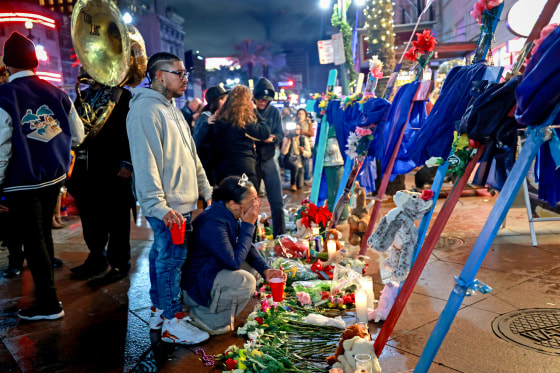
Bill Bratton, the top police officer in Boston, New York, and Los Angeles, is coming to New Orleans to advise the city on security measures in the wake of the tragic attack on Bourbon Street, the city’s police chief announced Wednesday.
At a municipal Council hearing on Wednesday, New Orleans Police Superintendent Anne Kirkpatrick announced that Bratton, 77, a more than 50-year veteran of law enforcement, will be a tactical expert on evaluating municipal security. At a press conference on Thursday, he will be publicly unveiled, she said.
Kirkpatrick stated that he personally took her call over the weekend to help assess any security vulnerabilities, citing Bratton as one of the nation’s foremost authorities on terrorism and hard targeting a city.
Before taking over the NYPD from 1994 to 1996 and returning for a second term as commissioner from 2014 to 2016, Bratton began his career in Boston and rose to the position of commissioner. From 2002 to 2009, he served as the LAPD’s chief. A request for comment from Bratton was not immediately answered.
The announcement was made at the first public meeting after the New Year’s Day terror attack, in which a man inspired by the Islamic State terrorist group crashed a truck into revelers on Bourbon Street, killing 14 and wounding scores more. The hearing was a joint hearing of the City Council’s Criminal Justice and Public Works committees.
Due to ongoing concerns about how the city’s security arrangements for New Year’s Eve and the Sugar Bowl may have been improved, State Attorney General Liz Murrill asked the Louisiana Bureau of Investigation to perform a thorough assessment and examination of those plans two days prior to the meeting.
When the attack occurred, there were no bollards—vehicle security barriers—along the highly used thoroughfare. Before the city hosted the Super Bowl in February, the barricades that had been in place for a number of years and occasionally broke down were taken down and replaced. The 700-pound steel Archer barriers that the city had previously employed to guard congested streets were also available, but they were not deployed.
The city has justified its approach, claiming that the French Quarter was heavily guarded by law enforcement, had police cars, and temporary security measures.
Kirkpatrick stated last week that this individual was going to give it his all and that he would have gone elsewhere if it hadn’t been on Bourbon.
Kirkpatrick, one of the people being investigated, stated during the meeting on Wednesday that she had no intention of stepping down.
According to Helena Moreno, president of the New Orleans City Council, the council will launch an investigation on Thursday to examine several contract clauses pertaining to the recently removed bollards and the status of the bollard replacement project going ahead.
She stated, “I do think it’s important to look back and figure out what gaps were there so that those gaps don’t continue.”
Moreno also asked for clarification on the New Orleans Office of Homeland Security and Emergency Preparedness’s involvement in the pre-attack security measures and questioned why it was not present at the session.
She mentioned a department that might hold the answers but isn’t present here.
According to her, the city’s Department of Homeland Security was responsible for deploying the various security resources during earlier administrations.
The question of who will be the accountable agency to make sure that all the infrastructure required is deployed is undoubtedly one that I do believe needs to be answered very soon, she said.
In response to a question about who oversees the city’s security bollards and barriers, Department of Public Works head Rick Hathaway stated that the Department of Public Works erected the infrastructure at the Department of Homeland Security’s and other organizations’ request.
Homeland Security or other departments oversee operations and maintenance, he added.
As the City Council questioned Kirkpatrick and the public voiced their displeasure with the city and the police security response during the attack, the hearing was occasionally confrontational.
During the hearing’s public comment period, the city’s Department of Homeland Security and Emergency Preparedness and its head, Collin Arnold, were lambasted for their absence.
Collin Arnold, where are you? During the public comment time, Bruce Reilly, the deputy director of the nonprofit organization Voters Organized to Educate, stated that he should be in that seat.
According to the council, Arnold was asked to take part.
Note: Every piece of content is rigorously reviewed by our team of experienced writers and editors to ensure its accuracy. Our writers use credible sources and adhere to strict fact-checking protocols to verify all claims and data before publication. If an error is identified, we promptly correct it and strive for transparency in all updates, feel free to reach out to us via email. We appreciate your trust and support!
